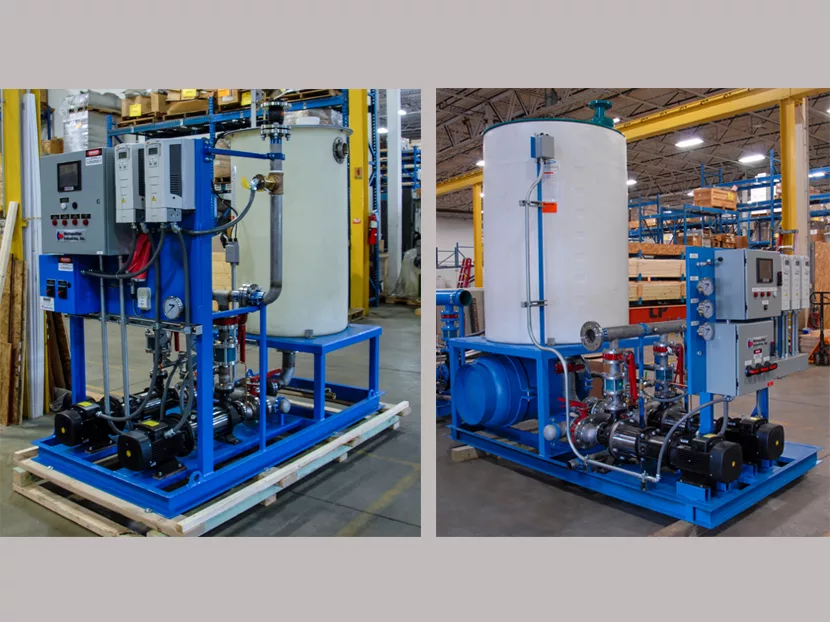For many years, the word “recycling” was most easily attached to things like old magazines, glass bottles, and aluminum cans, but today the term can be applied to much wider variety of resources, including water. Water recycling involves reusing treated wastewater for various applications where potable water isn’t required, including irrigation, industrial processes, and even toilet flushing.
Though the potential resource and financial savings made possible from the use of recycled water are significant, broad availability of this resource is not yet common in all areas. In part, this is due to consumers needing to shift their mindset to be more receptive to this offering. However, another major factor is the infrastructure required to offer both potable water and recycled (non-potable) water without the risk of cross contamination.
At Metropolitan, we specialize in helping municipalities, industry, and commercial facilities solve their water movement and management challenges throughout North America. This means that when a commercial property in Durham, North Carolina approached us about helping them safely embrace recycled water, we knew right away we’d be up for the task. After all, we specialize in both water and wastewater so, with recycled water falling somewhere in the middle, it’s certainly in line with our expertise.
Keep the lines from crossing
Because most recycled water – also referred to as reclaimed wastewater or reclaimed water – is not potable, facilities wishing to embrace this resource must have separate potable and recycle water lines and, for health reasons, it’s important that these lines remain separate. In other words, there’s not really any room for error. In many situations where separation is needed, a backflow preventer is all that’s required to prevent potential contamination, but sometimes a little additional peace of mind is helpful and, with recycled water, is often even required.
To help ensure the proper implementation of recycled water programs and the safe use of the water provided, the authority having jurisdiction (AHJ), be it the city, country, state, or otherwise, often has specifications in place which require the use of air gaps to help guarantee separation. Fortunately, Metropolitan long-ago mastered the protection of potable water supplies with our Air Gap Break Tank Systems.
All of our Air Gap Break Tanks are assembled in our Romeoville, Illinois facility and can be completely customized to meet the unique demands of every project. Metropolitan’s team of engineers, designers and application specialists can help integrate the system with the latest technological and intuitive control capabilities to meet our clients’. This means that, in addition to ensuring potable water is safe, our cloud-based SCADA, Metrocloud, can help keep tabs on everything while communicating securely between the master system and remote stations.
Most importantly, all of these systems prevent the direct contact between potable water and non-potable water within a building or facility by creating a physical air gap between the two lines. Though air gaps are one of simplest ways of preventing backflow, they’re also one of the most effective and we use them routinely in treatment plants, lift stations and laboratories. This setup forces rising water within the tank to leave the system through overflow exits before reaching supply pipe openings and prevents cross-contamination should there be a back-siphonage or backpressure backflow.
The Reclaimed Water Landscape in Durham
In Durham, North Carolina, reclaimed water is made available to certain customers who meet the use requirements in an effort to reduce the use of potable water for non-potable applications. However, to help users get the most out of their reclaimed water usage and further mitigate cross-contamination risks, training is also required for those wishing to obtain a use permit.
Our commercial client met all the requirements and completed the training but needed to ensure cross-contamination would not be an issue. The multiple tank, pump, and control options available through Metropolitan meant they would be able to install the exact system they needed and the Metropolitan name meant they would also be receiving a quality product with a history of success.
As water reclamation continues to grow in popularity, we remain ready to help however we can. From pumps to air gaps and everything in between, we’re looking forward to helping protect this planet’s most valuable resources by making reuse as safe and easy as possible.
Metropolitan Industries, Inc. is committed to manufacturing the finest products combined and offering premier service leads to the highest quality experience for customers. For more than 60 years, the company has diversified into one of the most unique pumping corporations in the business, serving as a single source for quality pumps, control systems and ancillary equipment serving the municipal, commercial, mechanical, industrial and residential water and wastewater industries.
Visit metropolitanind.com.





